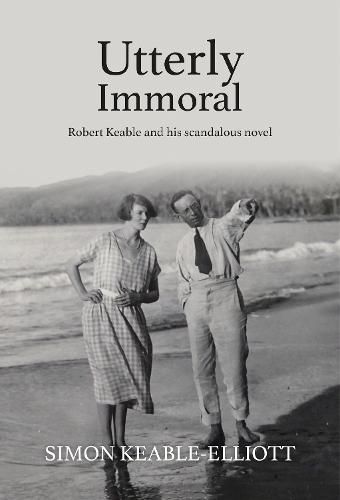Readings Newsletter
Become a Readings Member to make your shopping experience even easier.
Sign in or sign up for free!
You’re not far away from qualifying for FREE standard shipping within Australia
You’ve qualified for FREE standard shipping within Australia
The cart is loading…






This title is printed to order. This book may have been self-published. If so, we cannot guarantee the quality of the content. In the main most books will have gone through the editing process however some may not. We therefore suggest that you be aware of this before ordering this book. If in doubt check either the author or publisher’s details as we are unable to accept any returns unless they are faulty. Please contact us if you have any questions.
When Robert Keable’s First World War novel Simon Called Peter was published, critics called it ‘offensive’, ‘a libel’ and reeking of ‘drink and lust’. Scott Fitzgerald suggested it was ‘utterly immoral’ and referenced it in The Great Gatsby. The novel became a huge international best-seller, a Broadway play and the sequel made into a Hollywood movie. And it made its author an international celebrity. What critics did not know was that the novel, about a military chaplain and a young woman having an affair during the war, was autobiographical.
Utterly Immoral tells the remarkable true story of Robert Keable. He was an up-and-coming star of his Church. Raised in Croydon by evangelical parents he became increasingly high church while studying at Cambridge and, once ordained, he travelled to Zanzibar as a missionary. Following the outbreak of the First World War, he moved to Basutoland to work as a parish priest. He travelled to France as chaplain to the black labourers of the SANLC. It was during the war that he began to lose his faith, dispirited by the appallingly treatment of his men, the horrors of the war and the implications of his secret affair with the nineteen-year-old lorry driver, Jolie Buck. Having written Simon Called Peter he left the church, and his wife, and fled to Tahiti to live in Paul Gauguin’s house. He lived the celebrity life in Tahiti, marrying a Tahitian princess, dubbed the ‘Helen of Troy of Tahiti’.
The author, Robert Keable’s grandson, has used letters, books, articles, interviews and a trip to Tahiti to produce a fascinating account of Robert Keable’s life and the story of the success of Simon Called Peter.
$9.00 standard shipping within Australia
FREE standard shipping within Australia for orders over $100.00
Express & International shipping calculated at checkout
Stock availability can be subject to change without notice. We recommend calling the shop or contacting our online team to check availability of low stock items. Please see our Shopping Online page for more details.
This title is printed to order. This book may have been self-published. If so, we cannot guarantee the quality of the content. In the main most books will have gone through the editing process however some may not. We therefore suggest that you be aware of this before ordering this book. If in doubt check either the author or publisher’s details as we are unable to accept any returns unless they are faulty. Please contact us if you have any questions.
When Robert Keable’s First World War novel Simon Called Peter was published, critics called it ‘offensive’, ‘a libel’ and reeking of ‘drink and lust’. Scott Fitzgerald suggested it was ‘utterly immoral’ and referenced it in The Great Gatsby. The novel became a huge international best-seller, a Broadway play and the sequel made into a Hollywood movie. And it made its author an international celebrity. What critics did not know was that the novel, about a military chaplain and a young woman having an affair during the war, was autobiographical.
Utterly Immoral tells the remarkable true story of Robert Keable. He was an up-and-coming star of his Church. Raised in Croydon by evangelical parents he became increasingly high church while studying at Cambridge and, once ordained, he travelled to Zanzibar as a missionary. Following the outbreak of the First World War, he moved to Basutoland to work as a parish priest. He travelled to France as chaplain to the black labourers of the SANLC. It was during the war that he began to lose his faith, dispirited by the appallingly treatment of his men, the horrors of the war and the implications of his secret affair with the nineteen-year-old lorry driver, Jolie Buck. Having written Simon Called Peter he left the church, and his wife, and fled to Tahiti to live in Paul Gauguin’s house. He lived the celebrity life in Tahiti, marrying a Tahitian princess, dubbed the ‘Helen of Troy of Tahiti’.
The author, Robert Keable’s grandson, has used letters, books, articles, interviews and a trip to Tahiti to produce a fascinating account of Robert Keable’s life and the story of the success of Simon Called Peter.